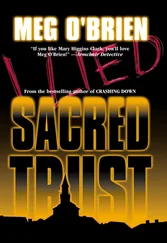Yes, yes. That is surely what is happening. They have been through this, Zuana and she, a dozen times: how, as soon as the convent is asleep, Zuana will make her way across the gardens and, using the abbess’s keys, let herself through first one door and then the other. She will open the chest, the girl will get out, and together they will go through the outer doors to wait on the dock until …
She must have woken too early. I cannot say for certain how long the drug will last. It would be better if you woke sooner rather than later, for it will be hard to move you if you are still under its influence.
She had listened to every word, never taking her eyes off Zuana’s face as she explained it once and then again. She trusts this woman absolutely and knows she would never do anything to hurt her. But while Zuana does not say it to her directly, she also knows that this is the first time she has used this remedy, so she cannot be certain one way or another how strong or how long.
What if she did not give her enough? What if she has woken halfway through? Perhaps she has not yet reached the storeroom. There may be converse in the room even now, ready to heave up the chest and move it down the stairs out into the grounds. Be quiet, Isabetta, she says to herself. Be calm. You must not make any noise now. Or waste any air.
She begins to pray There is so much to pray for. That she will make this man a good wife. That for all they have been through, they will care for, as well as love, each other and be mindful of God’s commandments. She prays that God will look after all those she leaves behind. She begs to be forgiven for her many trespasses, as she now willingly forgives those who, in their way, trespassed against her. Suora Umiliana, who meant no harm even if she could not help but cause it. The abbess, who did what her duty demanded but without whom she would not be free at all. And Suora Zuana—oh, Suora Zuana! — what can she ask of God on her behalf? As she searches for the words she feels the calm slipping away as the weight of cloth sinks more heavily on her face. She feels the urge to sing—to hear her own voice as a companion—but she does not dare.
How long has she been awake? Too long now, surely. Her head aches. Yes, the drug must have been strong enough. In which case how can it be that Zuana has not come? What if …?
What if? The two words release a wave of terror that seems to use up all the air around her so that she finds herself gasping.
What if someone is taken ill in the night and Zuana cannot get here?
What if in some way the plan has been found out?
What if there never was a plan?
Or what if this was the plan all along?
Sweet Jesus, what if this is the abbess’s final revenge to ensure her silence, and she is not in the storehouse at all but in the mortuary? Or worse—what if it is done already and she is even now buried, deep under the earth in the graveyard, as punishment for having brought the convent so close to ruin? What if, after all, she is going to die?
Once thought, it cannot be un-thought. As the panic hits she forces her bandaged hands up through the layers of silk till her knuckles crash into the lid above. The holes in her hands burn and throb as she pushes. But the wood is too heavy. Is it nailed down? Oh, dear God, it must be nailed down! She fills her lungs with whatever air is left and starts to shout. It will end as it began: with terror and tears and useless hammering against wood in the night.
“Help, oh, help me! I—”
And now she hears it: a knocking and scraping above her, then the sound of a key clunking and shifting in the lock, and a lid being lifted and pushed back.
“Hush, oh, hush. You must not make noise. I am here.”
The layers of cloth are pulled off and she takes a great gulp of air. In the darkness she makes out Zuana’s broad, smiling face above her.
“I thought—”
“I know …I know. But there is no time now. Come, come. The watch sister was a tiger tonight, and it took me longer to get away.”
Zuana’s voice wraps itself around her, encouraging, cajoling, as it has done for so long.
“Here, drink this. Acqua-vita. Just a few sips. It will give you strength. I have put some in a bag for you. Give me the crucifix. Where is it? Did you let go of it? No, I see it here. I will put that in the pouch too. I have made up two vials. One is for the apothecary. A good dispensary can never have enough acqua-vita, and the other you may trade for some small monies to get you out of the city. Ah, quickly, quickly, Isabetta. Can you walk?”
As they move across the room they can both hear it now— something bumping against the wood of the dock outside.
Zuana fumbles with the lock on the door. It opens with a fearful creak; the wind and rain have swollen and twisted the wood since the last time they were both here.
The dock is longer than she remembers it. On one side it slides away into black water. But at the other end, close to the convent’s rowboat, another small boat is docking, with a candle lantern at its prow. There are two figures aboard. Two? Zuana’s heart jumps for a moment. But he would have to bring someone to help, of course. The loyal apothecary, perhaps.
The man in the prow climbs up and onto the dock. Zuana holds up her own lantern to meet him. There is light enough to see that he is tall, lanky, with a scarf tied high around his neck. Down one side of his face runs a jagged dark line.
Isabetta sees him, too. She stands frozen to the spot. So frozen that in the end Zuana must give her a little push.
She moves slowly, groggy still, half limping toward him. They stop when there is still space between them. One might think they would fling themselves into each other’s arms. But instead it seems they are not sure they know each other anymore. After a second’s pause, he puts out a hand toward her and she gives him her bandaged one in return. He holds it most gently. The moment appears to last forever.
“You must go.” Zuana’s voice pushes them on. “Go now.”
The girl turns and smiles quickly, and then they are on their way; the two of them clambering into the boat, the ropes freed from the mooring, the second man maneuvering the craft backward, turning, then rowing quickly out into the water until they are eaten up by the darkness and all one can hear is the splash and chop of oars.
Zuana stands listening until the sound dies away. Then she goes back inside and locks the door. She replaces the wedding shift and the top sheets, smoothing out their surfaces as best she can, and puts the lid back into place before moving into the inner storeroom and from there out into the convent grounds, locking each door carefully behind her.
She makes her way quickly back across the orchard and gardens toward the second cloisters. As she passes the herb plot, it comes upon her to wonder whether or not the calendula will be sprouting yet, and she makes a note to check it first thing at work hour, for she has grown somewhat lax in the affairs of the dispensary of late, and it will not be long until spring is fully upon them.
In her cell, she says a prayer that their new life together will be pure, and then prays for the souls of all those around her in the convent, for their benefactors, and for the rulers of the city, both alive and dead, before lying down to sleep.
As she lets her mind slide away, she recites a few of the remedies from the books that will be buried in the graveyard tomorrow. From now on, every night, she will memorize a few more. Of course she will never be able to reproduce her library in her head; that would be impossible. Not even her father could do so much.
The work of revealing God’s secrets through nature is not meant to be easy, Faustina. You would do well to remember the words of Hippocrates: “Life is short, the art long, opportunities fleeting, experiment treacherous, and judgment difficult. ” Ah, such humility in a man born so long before Christ. For all our knowledge now, he is yet to be surpassed.
Читать дальше












